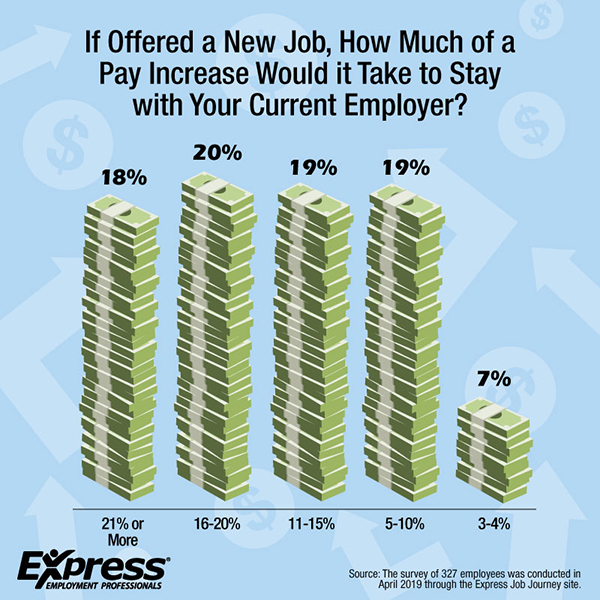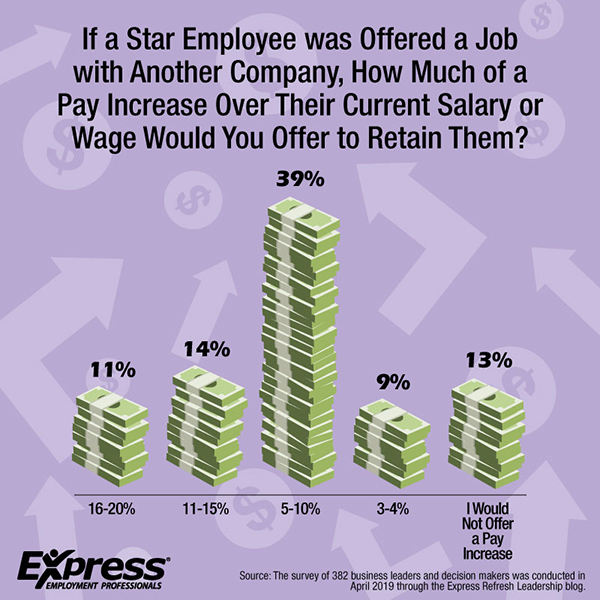Talent Wars: How Much Money Does It Take to Keep an Employee?
OKLAHOMA CITY - May 22, 2019
New Survey Reveals What Workers Want, Employers Willing to Offer
57% of Workers Want a Raise of 10% or More
Tight Labor Market Keeps Upward Pressure on Wages
Good talent is hard to find, and the tight labor market is leading some employers to wage bidding wars over talent. But how much money is enough to convince an employee to turn down a job offer and stay with their current employer?
In a recent survey, Express Employment Professionals posed that question to job seekers and also asked employers how much they would be willing to offer a star employee to stay with the company. On average, employees want more than employers are willing to offer.
Job seekers were asked, "If offered a new job, how much of a pay increase would it take to stay with your current employer?"
- 20% said 16 to 20%
- 19% said 11 to 15%
- 19% said 5 to 10%
- 18% said 21% or more
- 7% said 3 to 4%
- 7% said "other," noting that they would take into consideration the specific job offer and things such as benefits packages
- 6% said they would stay without a pay increase
- 3% said 1 to 2%
Employers were asked, "If a star employee were offered a job with another company, how much of a pay increase over their current salary or wage would you offer to retain them?"
- 39% said 5 to 10%
- 14% said 11 to 15%
- 13% said they would not offer a pay increase
- 11% said 16 to 20%
- 9% said 3 to 4%
- 7% said "other," citing concerns such as individual circumstances and benefits
- 6 % said 21% or more
- 1% said 1 to 2%
Overall, 57% of employees said they would want a raise of more than 10%, while only 30% of employers said they would be willing to offer more than 10%, even to a star employee.
Terri Greeno, an Express Employment Professionals franchise owner in Crystal Lake, Illinois, says she tells companies that while the minimum wage is $8.25 by law, in effect, the "new minimum wage" is $11 to $12 an hour due to high demand.
Greeno stresses that even employers who do not raise wages in this competitive labor market are "paying for it one way or another" in the form of high turnover or additional overtime.
In Michigan, Janis Petrini, a Grand Rapids franchise owner, says wages have continued to increase over the last year. She says she's seen the most pronounced increase for hourly workers, largely because "it is much easier to see the changes at the hourly level since these wages tend to be set for specific positions."
Brandon Malloy, an Express franchise owner in McMinnville, Oregon, says the upward pressure on wages in his area remains "strong" but that some companies are remaining "hard headed" about not offering higher pay-and losing workers as a result. He says an entry-level worker will switch jobs for a $1 per hour increase; a mid-level or skilled worker will change for a $3 per hour increase; and a professional will switch for a $5,000 salary increase.
Chris Ashcraft, a franchise owner in Mobile, Alabama, agrees that an entry level hourly worker will switch jobs for a $1 per hour increase. In his area, it is difficult to fill a job for less than $10 an hour, and he expects wages "will continue to rise." Companies that cannot afford to pay increases often offer other benefits like bonuses for attendance or healthcare.
"It has never been easier for workers to jump between jobs," said Bill Stoller, CEO of Express. "And because workers are so mobile, there's less fear about leaving a 'good job' for a pay increase. If the new job doesn't work out, there are plenty of other employers eager to hire. Businesses have to keep their finger on the pulse of the local economy, or they risk losing the talent wars."


###
If you would like to arrange for an interview with Bill Stoller to discuss this topic, please contact Sheena Karami, Director of Corporate Communications and PR, at (405) 717-5966.
About Bill Stoller
William H. "Bill" Stoller is chairman and chief executive officer of Express Employment Professionals. Headquartered in Oklahoma City, the international staffing company has more than 800 franchises in the U.S., Canada and South Africa. Since its inception, Express has put more than 7.7 million people to work worldwide.
About Express Employment Professionals
Express Employment Professionals puts people to work. It generated $3.56 billion in sales and employed a record 566,000 people in 2018. Its long-term goal is to put a million people to work annually. For more information, visit
ExpressPros.com.